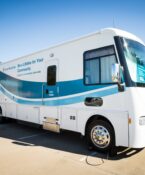The link between Alzheimer’s and Down syndrome
A blood test developed at UNT Health Science Center to detect Alzheimer’s disease will be used in a new study that focuses on individuals with Down syndrome, who are at high risk of developing memory problems.
The study is one of four exploring the link between Alzheimer’s disease and Down syndrome that are receiving $250,000 grants from the Alzheimer’s Association, the Crnic Institute for Down Syndrome and the Global Down Syndrome Foundation. The goal is to bolster development of a simple, inexpensive, noninvasive test that can detect the risk of Alzheimer’s disease.
The study is being led by Nicole Schupf, PhD, Professor of Epidemiology at Columbia University Medical Center in New York City, and Sid O’Bryant, PhD, Director of the Center for Alzheimer’s and Neurodegenerative Disease Research at UNT Health Science Center.
“Prevention of Alzheimer’s dementia may be more effective and easily achieved than attempting to treat the disease once symptoms already exist and irreversible damage to the brain has already occurred,” said Dean Hartley, PhD, Director of Science Initiatives for the Alzheimer’s Association. “For this approach to be successful, we must be able to simply and accurately assess risk early in the disease process.”
“Autopsy is still the only way to definitively diagnose Alzheimer’s disease,” said Michelle Sie Whitten, President and CEO of the Global Down Syndrome Foundation. “If these researchers are successful we will be one step closer to catching Alzheimer’s in its early stages and hopefully then be able to treat people with the disease earlier and actually prevent dementia from occurring, when new treatment options become available.”
Nearly all adults with Down syndrome begin developing the brain changes of Alzheimer’s in their 30s. By age 55 or 60, it is estimated that between 55 percent and 70 percent of these individuals will develop dementia.
Because people with Down syndrome are at high risk for Alzheimer’s, answers to important research questions about the disease may be developed more quickly in this population than by studying people with sporadic, late-onset Alzheimer’s, where symptoms appear most often after age 65 – and in many cases not until the 70s or 80s.
Scientists are not sure exactly why individuals with Down syndrome are at high risk for Alzheimer’s disease but past research shows that a gene on chromosome 21 codes for the amyloid precursor protein (APP) that gets cut into fragments that accumulate into the hallmark amyloid brain plaques of Alzheimer’s. People with Down syndrome are born with an extra copy of chromosome 21.
“Our research could provide new information about potential biomarkers, including protein changes detected in blood, that could more accurately and easily predict the risk for Alzheimer’s disease in people with Down syndrome,” Dr. Schupf said. “If successful, we believe there is a chance that these biomarkers could also be used to assess Alzheimer’s risk in all groups of people.”
The Alzheimer’s Association is the largest nonprofit funder of Alzheimer’s research, having awarded more than $350 million to over 2,300 projects since 1982. The Association currently supports more than 350 ongoing research projects in 21 countries totaling more than $82 million.
The Global Down Syndrome Foundation raises funds for the Crnic Institute for Down Syndrome to underwrite critical research benefiting people with Down syndrome. To date, $5.7 million in research grants has been given to 33 investigators.


![Uyen Sa Nguyen Scaled[58]](https://www.unthsc.edu/newsroom/wp-content/uploads/sites/16/Uyen-Sa-Nguyen-scaled58-145x175.jpg)



Social media